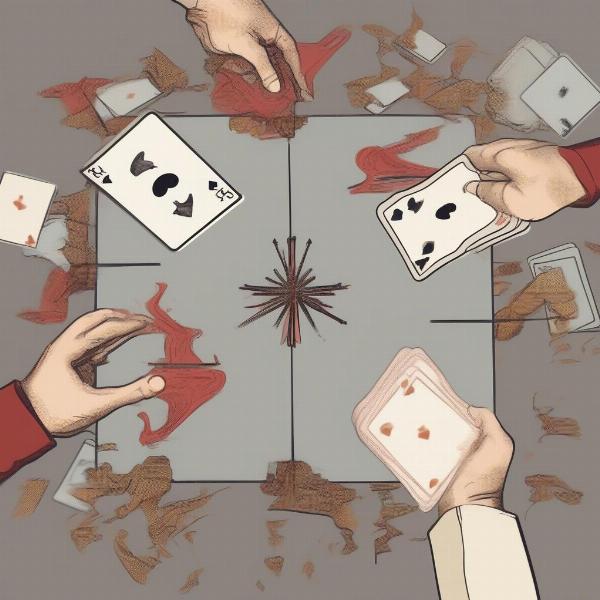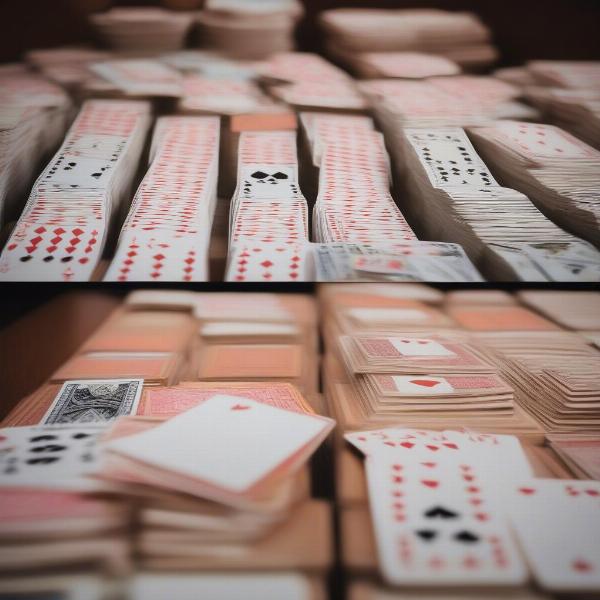The card game War, a staple in many households, often appears to be purely luck-based. However, at Supreme Duelist Blog, we believe understanding the nuances of any game can elevate your gameplay. While seemingly simple, a deeper look reveals subtle strategies that might just tip the odds in your favor. This article will delve into these tactics and provide you with the knowledge to maximize your chances of victory.
This guide will explore the rules of War, address the perceived luck factor, and outline specific strategies to improve your gameplay. We’ll cover everything from card handling to understanding probability, all designed to shift your perception of this seemingly random card game. So, while you can’t eliminate chance entirely, you can play smarter and win more often.
Understanding the Basic Rules of War
War, at its core, is a remarkably straightforward game. The standard 52-card deck is divided equally between two players. Each player holds their cards face down in a pile. The game proceeds with both players simultaneously revealing the top card of their deck. The player with the higher-ranked card wins the round and collects both cards, placing them at the bottom of their pile. If both players reveal cards of equal rank, a “war” ensues.
During a war, each player places three cards face down, followed by one card face up. The player with the highest face-up card wins all the cards in that “war”. If these face-up cards also have equal rank, another war occurs, and this process repeats until one player has a higher card. The game continues until one player acquires all the cards in the deck, securing their victory. The simplicity of this game is why it’s so accessible, but this also means the small nuances matter even more. Understanding these rules sets the foundation for understanding the subtle strategies we’ll explore further.
 card game war rules explained
card game war rules explained
The Role of Luck vs. Strategy
It’s often said that War is purely a game of chance. And it’s true: the order in which you receive your cards is entirely random. But, is that all there is to it? While luck certainly plays a significant role, there are still some ways to improve your odds. Acknowledging the role of randomness is crucial, but to only view War as a game of chance is a disservice to its strategic potential. By understanding how cards are distributed and how probability works, even in its most basic form, can give you a slight but important edge.
Advanced Strategies to Win
Moving beyond the basic rules, let’s delve into some strategies that might just give you an advantage in the card game War. While it’s not about stacking the deck, there are certain techniques you can employ to think more strategically about the cards you hold and how they interact with your opponent’s. Similar to the tactics that might be employed in [egyptian war card game rules], these strategies focus on observation and understanding the ebb and flow of the game.
Card Counting (In a Modified Way)
You’re not going to be counting cards in the traditional sense, since you don’t know the other player’s hands in War. However, keeping a rough mental tally of the face cards and aces you’ve seen can be advantageous. For example, if a few aces have already been played, your chances of encountering one, particularly in a war, diminishes. Similarly, if there have been many battles with low cards, it means the higher-valued cards are likely still in play, and could show up at any point. This modified form of card counting is an exercise in probability awareness and can help inform your expectations. It’s less about predicting the next card but rather understanding what’s left in the deck.
Managing Your Card Pile
After winning a round, or even a ‘war’, the tradition is to put those collected cards at the bottom of your pile. While this seems simple enough, there’s a small strategic element at play here. Observe your pile: if a few wins come your way in a row, are those cards being stacked in an order beneficial to you, or are they mixed? While you can’t rearrange them deliberately, you can be aware of this pattern. Furthermore, understand that the cards you are stacking are coming back into the play. Unlike some other trading card games like the [gundam ms war trading card game], where discarding is permanent, cards in war always come back into the game.
 card game war strategic gameplay
card game war strategic gameplay
The Psychology of War
The card game War can be quite a monotonous game for some, but for others the simple tension can be exciting. It might seem absurd to consider psychology in a game of such simple rules but understanding your opponent and their reactions can give a small advantage. Are they excited about every win? Are they impatient when the wars occur? These tells, often subtle, might just reveal something about their card holdings, or at least how they perceive their chances, which can influence their behaviors in the game.
“The key to winning War isn’t just about having the better cards, it’s about understanding the probability and anticipating what might be coming based on what you have already seen,” says Dr. Emily Carter, a cognitive psychologist and avid card game enthusiast. This highlights that, while a game like [star wars: the deckbuilding game] may involve more complex strategies, any game, even one perceived as luck-based, can benefit from a strategic mindset.
Recognizing Patterns and Probability
War is a game of chance, yes, but certain patterns can emerge. Are there long streaks of low cards or high cards? Is a war happening every other turn? When you acknowledge these patterns, it can give you a general sense of what may come next. Understanding the very basic principles of probability is also key here. For instance, in a standard 52-card deck, there is an equal amount of each suit, and four cards of each rank. If you can track which ranks have been depleted, it can help you understand the likelihood of finding specific cards remaining in play. This doesn’t give you absolute certainty, but a general probability understanding to assist your game. This basic understanding of probability is just as useful in games like [wonderland’s war board game].
Timing and Pace
While not always applicable, the pace at which you play the game can influence your chances, or at least how you perceive them. Playing too fast might make you miss crucial details, while playing too slow may frustrate you or your opponent. Find a rhythm that works best for you, allowing for both focus and enjoyment. This ability to maintain the tempo of a game, can also prove advantageous in board games such as [star wars board game 1977] where pace of action is key to success.
Common Mistakes to Avoid
Just as there are strategies to improve your odds in War, there are also common mistakes to avoid. The first and most significant is blindly playing the game without paying any attention. It’s also a mistake to think that there is absolutely no room for strategy, as the elements discussed above indicate. Remember, while luck is a major factor, thoughtful consideration of the state of the game can still provide you an edge.
Thinking Every Round is Random
While each round is independent, the entire game is made up of the results of all the rounds. So, viewing each turn in a vacuum can limit your perception. Try to look at the big picture and understand how the game is progressing as a whole. The cards played before do have an influence on what remains in the deck, and thinking about this can greatly inform your strategy.
“Players often focus on individual card flips, overlooking the bigger picture and the statistical landscape of the game,” says Professor Michael Chen, a statistician specializing in game theory. “Even in a game seemingly driven by luck, an understanding of probability is a powerful tool.”
Ignoring Observation
Another error is simply ignoring the cards your opponent has played, or, even worse, ignoring the cards you have already played. This information is not as valuable as it would be in a game like poker, but still it’s not something you should disregard. Every card you see provides a data point on the cards that have not yet been played.
Conclusion
While War remains a game highly influenced by luck, incorporating strategies and mindfulness can absolutely increase your chances of success. By understanding the basic probability, observing cards, and recognizing patterns, you can move beyond just the random flip of a card. Remember, it’s about optimizing your decisions with the limited information you have. So, while luck might deal the cards, knowledge will help you play them. At Supreme Duelist Blog, we encourage you to explore the depth in all games, even the simplest ones. Continue exploring the strategies and tactics for other games on our site, and become a true supreme duelist! We hope this has given you a new perspective, and a stronger game.
Leave a Reply